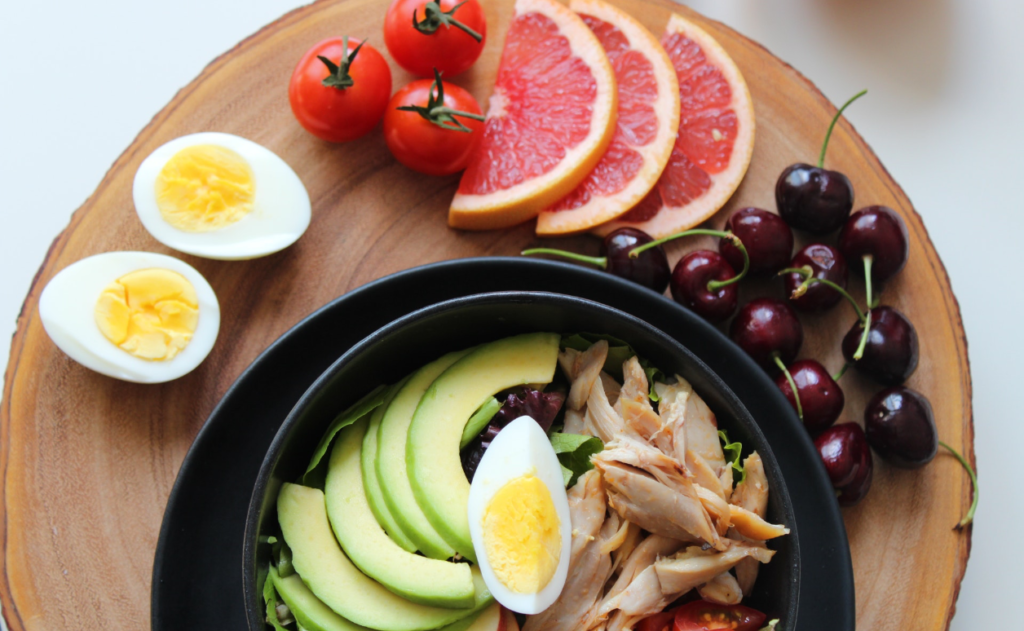
Ready to finally start a healthy living journey? Here are a few simple ways to get started.
Drink lots of water
The U.S. National Academies of Sciences, Engineering, and Medicine determined that women should be drinking about 2.7 liters of water a day and men about 3.7 liters.
There’s so many benefits to drinking water. It improves memory and mood, reduces sugar cravings and aids weight maintenance, improves your performance when you exercise, the list goes on!
Don’t forget your fruits and vegetables
Fruits and vegetables help give your body the vitamins and minerals it needs, like Vitamin C and potassium.
They’re a great source of fiber, too, which helps regulate gut health and digestion. But, if you’re diabetic, it’s important not to eat too many fruits as they are higher in carbohydrates and sugar.
Eat breakfast
Why is it called breakfast? Well, because breakfast is intended to break the overnight fasting period. It gets your body going again: replenishes your glucose supply, giving you energy and alertness, and kick-starts your metabolism.
Not to mention, breakfast improves your ability to concentrate in the short term. It can help with weight management and reduce risks of type two diabetes and heart disease. It’s also shown to lower levels of “bad” LDL cholesterol.
Get active
Regular activity helps lower your risk of high blood pressure and heart disease, helps maintain a healthy body weight, and improves mental health.
It’s okay to start slow! Even 5 minutes of physical activity a day has real health benefits.
Get a good night’s sleep
The National Sleep Foundation recommends between 7 and 9 hours of sleep per night for adults. While it’s true that sometimes busy schedules get in the way of a full night’s rest, here are five reasons to prioritize a good night’s sleep when you can.
A good night’s sleep can…
- Boost your immune system
- Prevent weight gain
- Strengthen your heart
- Improve your mood and memory
- Increase productivity and exercise performance
Limit alcohol intake
There’s a few reasons it’s healthy to limit your alcohol consumption. For one, alcohol is a depressant, meaning it slows down parts of the brain and impairs cognitive function. It can also make you gain weight, as well as damage your liver.
No smoking
Whether it’s cigarettes or something else, the bottom line is smoking of any kind has harmful health effects, especially to your lungs. Not to mention, when you smoke you’re putting others at risk by exposing them to secondhand smoke.
Be positive
Positive thinking can actually provide real health benefits! These can include increased life span, lower rates of depression, and lower levels of distress.
How? Some of us have an easier time being positive than others. If it doesn’t come naturally to you, that’s okay! It’s possible to train your brain how to think more positively. Start by focusing on the good things. Challenges are always going to be a part of life. When you’re faced with one, look for the silver lining.
Studies show that keeping a gratitude journal can improve a sense of optimism and well-being. Your gratitude journal can be as formal or informal as you want it to be, even if you’re just jotting down a few things you’re thankful for each day, it’ll help you feel more positive about your life overall!
Preserve a work-life balance
Work-life balance allows you to separate work and home, so that the stress of work stays at work and doesn’t preoccupy you outside office hours. Work-life balance helps manage anxiety and prevents burnout.
Not sure how to establish better work-life balance? Here’s some tips!
- Have set work hours and stick to them.
- Invest in time-tracking tools. Time-tracking software allows you to build an understanding of how long particular tasks take, so that you can more effectively plan out and maximize your work days.
- Prioritize your tasks into four categories: urgent and important, important but not urgent, urgent but not important, and neither urgent or important. This will help you plot out what you really need to get done during your work hours, so that your home hours are unencumbered.
- Be intentional in setting aside personal time at home. Make time for something you love!
Relax!
It’s good to take time everyday to relax and enjoy leisure activities! Doing something just for fun, or doing nothing at all, improves emotional well-being and happiness–and a happy you is a healthier you!